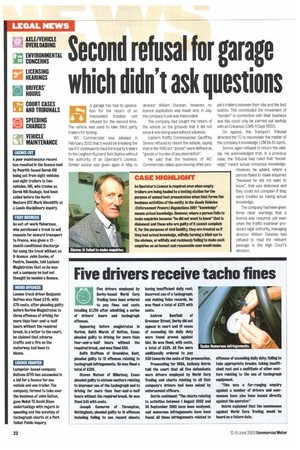Second refusal for garage
Page 22

If you've noticed an error in this article please click here to report it so we can fix it.
which didn't ask questions to. A garage has had its applica
tion for the return of an impounded tractive unit refused for the second time. The vehicle was used to take third party trailers for testing.
WC Commercials was advised in February 2002 that it would be breaking the law if it continued to haul third-party trailers to the Leighton Buzzard Test Station without the authority of an Operator's Licence. Similar advice was given again in May to
director William Dunstan. However, no licence application was made and, in July, the company's unit was impounded.
The company had sought the return of the vehicle on the grounds that it did not know it was being used without a licence.
Eastern Traffic Commissioner Geoffrey Simms refused to return the vehicle, saying that in the 1995 Act 'goods" were defined as "goods or burden of any description".
He said that the business of WO Commercials relied upon moving other peo ple's trailers between their site and the test station. This constituted the movement of "burden" in connection with their business and this could on be carried out lawfully with an 0-licence (CM5-11 Sept 2002).
On appeal, the Transport Tribunal directed the TO to reconsider the matter of the company's knowledge (CM 24-30 April).
Simms again refused to return the vehicle. He acknowledged that, in a previous case, the Tribunal had ruled that "knowledge' meant actual conscious knowledge. However, he added, where a person Wed to make enquiries "because he did not want to know", that was dishonest and they could not complain if they were treated as having actual knowledge.
The company had been given three clear warnings that a licence was required, yet even when the traffic examiner produced legal authority, managing director William Dunstan had refused to read the relevant passage in the High Court's decision.












































































































































































